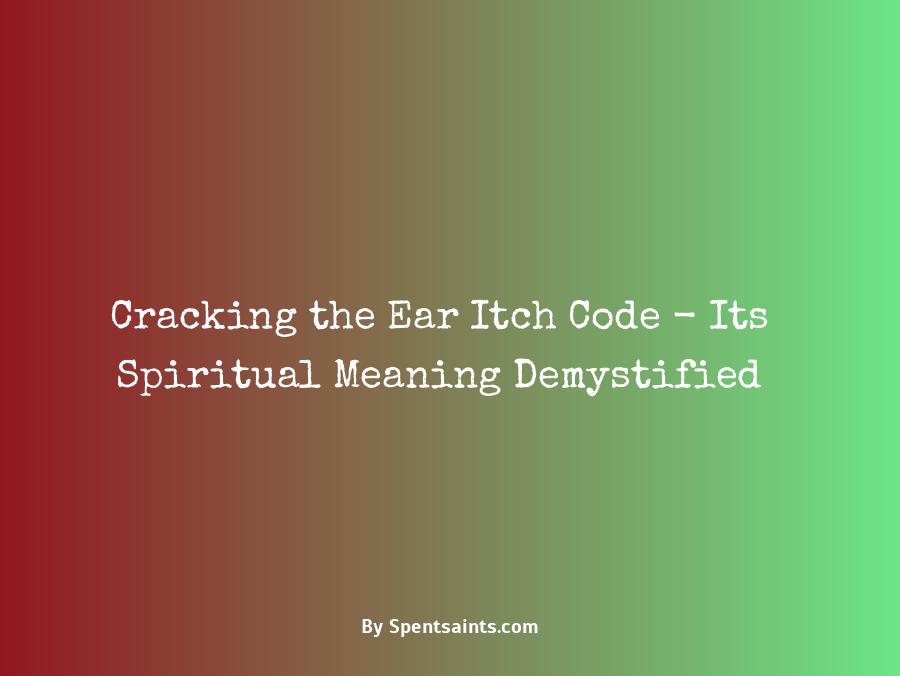Itching ears have long been associated with spiritual meanings, omens, and superstitions across many cultures and faiths. But what is the truth behind these ear-related myths and legends?
We uncover the mysterious world of spiritual ear itches, their ascribed meanings, and whether there could be some greater cosmic truth behind the discomfort or an urgent need to see your doctor!
Examining Ear Itching Spiritual Meanings and Superstitions
Itchy ears provoke much intrigue in superstition and spirituality. But where did these myths originate? Let’s explore some common folklore and omens related to itching ears.
Symbolism of the Right Versus Left Ear
Many spiritual traditions differentiate between the symbolism of right and left body parts. The same applies to itchy ears.
An itch in your right ear often carries positive meaning about forthcoming news, being told nice things, or learning delightful information. You may receive compliments soon or hear good gossip!
By contrast, an irritating left ear foretells potential bad news, mean talk, or unwelcome communication. Someone might criticize or slander you behind your back – so beware of false friends!
Itchy Ears and Money Matters
According to old European lore, an itchy right palm means you’ll receive money soon, while a bothersome left palm indicates future outflows. Ear itches have similar connotations in some traditions.
An itchy right ear signals that fortune will soon shine on you financially. It portends prosperity, inheritance, or an unexpected windfall. Perhaps you’ll get that bonus or tax refund!
Meanwhile, an aggravated left ear traditionally bodes ill for wealth and money matters. It could signify unexpected bills, unplanned expenses, or even irresponsible spending habits ahead.
Visitors Are Coming!
Many long-held superstitions associate itchy ears with company soon to arrive. Typically, the left ear indicates visitors approaching from behind you or unexpected guests. The bothersome right ear foretells of guests approaching from the front or expected company.
So next time your ears start to tickle, listen closely! Those annoying ear twinges might be reminding you to tidy up – you’ll soon have visitors on the way.
Decoding the Hidden Messages Behind Ear Itches
Beyond superstitious lore, many spiritual traditions view bothersome ears as symbolic divine messages from realms unseen. But what do ear itches really mean in religious and mystical context?
Symbolic Meanings in Spirituality
Ear itching holds various symbolic meanings in faith:
- Divine Guidance – Itchy ears indicate communication and guidance from the spirit world. Pay attention for signs, wisdom, or answers to your questions.
- Supernatural Sensitivty – They signify greater attunement to mystical realms and paranormal phenomena like clairvoyance or mediumship.
- Spiritual Awakening – Ear itches mark a deeper stage of enlightenment, higher consciousness, or kundalini awakening.
Alternatively, bothersome ears provoke reflection on whether you’re really listening – to divine guidance, others, or your higher inner truth.
Signals from the Divine or Simply Superstition?
Are irritating ear twinges truly messages from angelic beings or the Almighty? Or is this mere myth and magical thinking?
Some spiritualists argue that seemingly random body symptoms have greater purpose – to grab one’s attention towards subtler realities. Physical triggers manifest when someone needs inner growth or cosmic course correction.
Skeptics counter that superstitious ear meanings are mainly confirmation bias. We tend to selectively notice ear itches that align with events while ignoring those that don’t.
Ultimately, whether divine intervention or coincidence depends on one’s beliefs. But subtle signals may await those open to deeper dimensions behind mundane reality.
Ear Itching Interpretations Across Religions and Cultures
Itching ears engender many faith-based interpretations. Let’s examine meanings across spiritual traditions:
Chinese and East Asian Traditions
Chinese culture views right ear itches as positive, indicating forthcoming good fortune or auspicious news. Meanwhile, bothersome left ears imply potential bad luck or troubles ahead – so be cautious!
In Daoist traditions, external symptoms like ear itching reflect the state of internal energy flow. Ear irritations imply blocked pathways and signal a need to address areas of life out of harmony – physically, mentally, spiritually.
Indian and Ayurvedic Perspectives
Ayurveda associates right ear itching with hearing positive talk or desired news soon. The left ear indicates possible criticism, anger, or argument targeting you – prompting awareness to respond calmly.
Furthermore, Indian spiritual teachings regard itchy sensations as disturbances in subtle energy centers (chakras) near ears. Ear chakras connect to thyroid and parathyroid energy influencing metabolism and growth.
Therefore, Ayurveda views bothersome ears as prompts to balance nutrition, rest, and lifestyle.
Native American Shamanism Viewpoints
Within Native American folklore, ear itching marks the arrival of new spiritual knowledge or an important message – one that demands alert attention and receptivity. Alternatively, persistent ear irritation cautions against egotism and urges cultivating humility instead.
Moreover, certain tribal traditions associate right ear itching with positive news from also unseen forces. But the left ear implies potential danger forthcoming, signaling a need for protection prayers.
In Native shamanism, physical signs often have multilayered spiritual meaning. Situated at entrances to spirit worlds, ears connect the mundane with mystical.
The Bible contains various ear symbolism. Hearing relates to understanding truth, while deafness reflects hard-heartedness.
Notably, 2 Timothy 4:3 states “…the time will come when people will not endure sound doctrine. But wanting to have their ears tickled, they will accumulate for themselves teachers in accordance to their own desires.”
Some biblical scholars interpret this ear tickling passage as: messages people wish to hear for emotional comfort versus wisdom needed for growth. Perhaps ear irritations sometimes serve to refocus attention towards inconvenient yet necessary messages.

Dreams, spirit, growth – I explore them all. Laugh, learn, grow with me. Unlock your inner guru.
